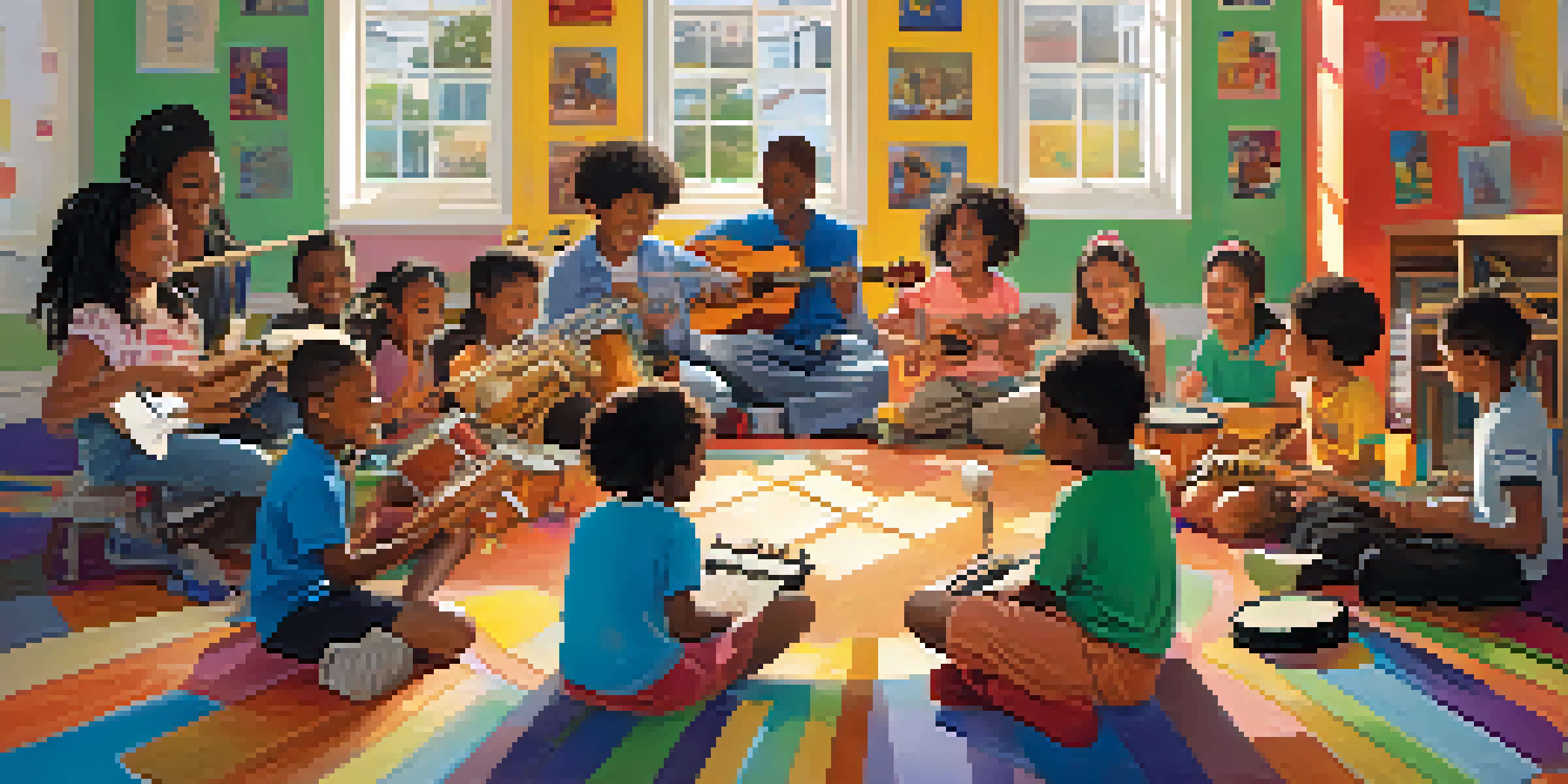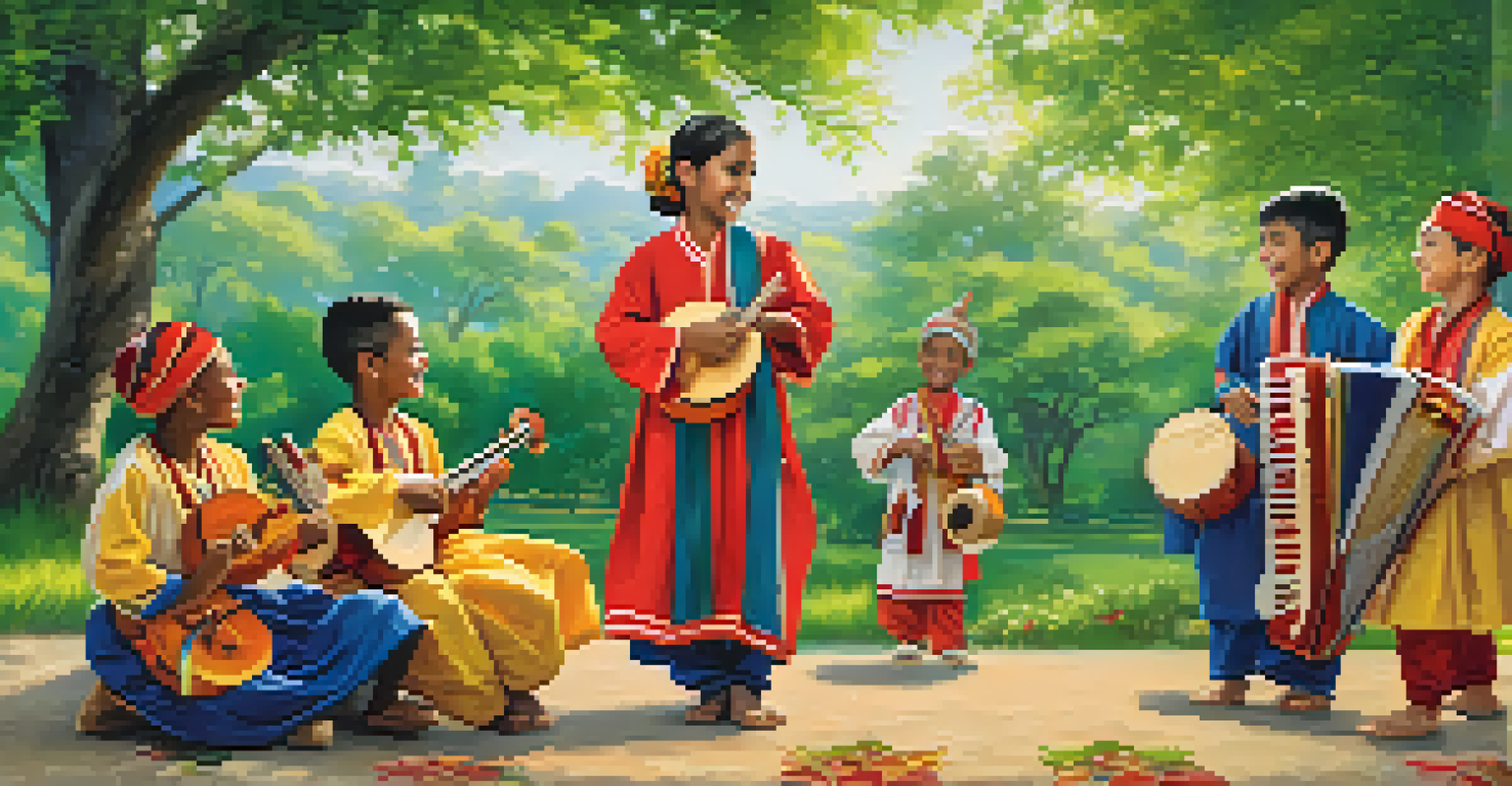Music Education: Fostering Social Skills in Young Children

The Importance of Music Education for Social Development
Music education plays a vital role in the overall development of young children. It doesn't just teach them notes and rhythms; it fosters essential social skills. When children engage in music-making, they learn to communicate, collaborate, and connect with their peers.
Music can change the world because it can change people.
At a young age, kids are naturally curious and eager to interact. Music provides a unique platform for them to express themselves and understand others. Through group activities like singing or playing instruments together, they learn to share, take turns, and respect each other's contributions.
Moreover, participating in music education can boost children's confidence. As they perform together, they build camaraderie and develop a sense of belonging, which is crucial for their emotional and social well-being.
Enhancing Communication Skills Through Music
One of the most significant benefits of music education is the enhancement of communication skills. When children sing or play music, they practice expressing their thoughts and emotions in a creative way. This expression helps them articulate their feelings more clearly in everyday life.

In music, children learn to listen actively, a skill that directly translates to better communication. They must pay attention to their classmates while performing, which helps them understand the importance of listening before responding, a vital social skill.
Music Boosts Social Skills
Engaging in music education helps children develop essential social skills such as communication, teamwork, and empathy.
Additionally, music's rhythmic and melodic elements can improve verbal skills. Rhymes and songs help children expand their vocabulary and understand the nuances of language, making them more effective communicators as they grow.
Teamwork and Collaboration in Music Education
Music education inherently involves teamwork and collaboration. Whether in a choir or a band, children learn to work together towards a common goal—creating beautiful music. This experience teaches them the value of cooperation and collective effort.
The beautiful thing about learning is that no one can take it away from you.
As they navigate different roles within a group, children also learn about responsibility. Each member contributes to the final performance, emphasizing that every individual's effort matters. This understanding fosters a sense of accountability and mutual respect.
Moreover, overcoming challenges as a group cultivates resilience. When they face difficulties in learning a piece or synchronizing their performance, they learn to support one another, reinforcing the importance of teamwork in achieving success.
Empathy and Understanding Through Musical Expression
Engaging with music allows children to explore emotions, fostering empathy and understanding. When they listen to different genres or interpret various pieces, they learn to appreciate diverse perspectives. This exposure can deepen their emotional intelligence.
For instance, performing a sad song can prompt children to reflect on feelings of loss or longing, helping them connect with others who may feel the same. By expressing their own emotions through music, they also become more attuned to the feelings of their peers.
Builds Confidence Through Performance
Participating in performances enhances children's self-esteem and encourages them to take pride in their accomplishments.
This empathetic engagement cultivates a supportive environment. Children who understand and respect others' emotions are more likely to build strong and positive relationships, an essential social skill that benefits them throughout life.
Boosting Self-Esteem and Confidence Through Performance
Music education often involves performances, which can significantly boost a child's self-esteem. Standing in front of an audience, even if it's just family or friends, helps children overcome anxiety and develop confidence in their abilities.
As they practice and prepare for performances, they learn to set goals and work diligently to achieve them. This process instills a sense of accomplishment, reinforcing their belief in themselves and their skills.
Moreover, positive feedback from peers and adults after a performance can further enhance their self-worth. Knowing that their efforts are acknowledged encourages children to take pride in their achievements and motivates them to continue growing.
Cultural Awareness and Inclusivity Through Music
Music is a universal language that transcends cultural boundaries. By incorporating diverse musical styles and traditions into education, children gain a broader understanding of the world around them. This exposure nurtures cultural awareness and appreciation from a young age.
Learning about different musical genres opens discussions about the cultures they originate from, promoting inclusivity and respect for differences. Children learn to celebrate diversity, which is essential in our increasingly global society.
Fosters Cultural Awareness
Music education exposes children to diverse musical traditions, promoting inclusivity and appreciation for different cultures.
Additionally, when children collaborate on multicultural music projects, they learn to value each other's backgrounds. This collaborative spirit fosters friendships and connections that might not have formed otherwise, enriching their social experiences.
Long-Term Benefits of Music Education on Social Skills
The benefits of music education extend far beyond childhood. Research has shown that children who participate in music programs often develop stronger social skills as they grow. They are more likely to engage in community activities and foster meaningful relationships.
As they transition into adulthood, these individuals often find it easier to navigate social situations. Skills learned through music education—such as teamwork, empathy, and effective communication—are invaluable in both personal and professional realms.

Ultimately, investing in music education is investing in the future of our children. By fostering social skills through music, we equip them with the tools they need to thrive in an interconnected world.